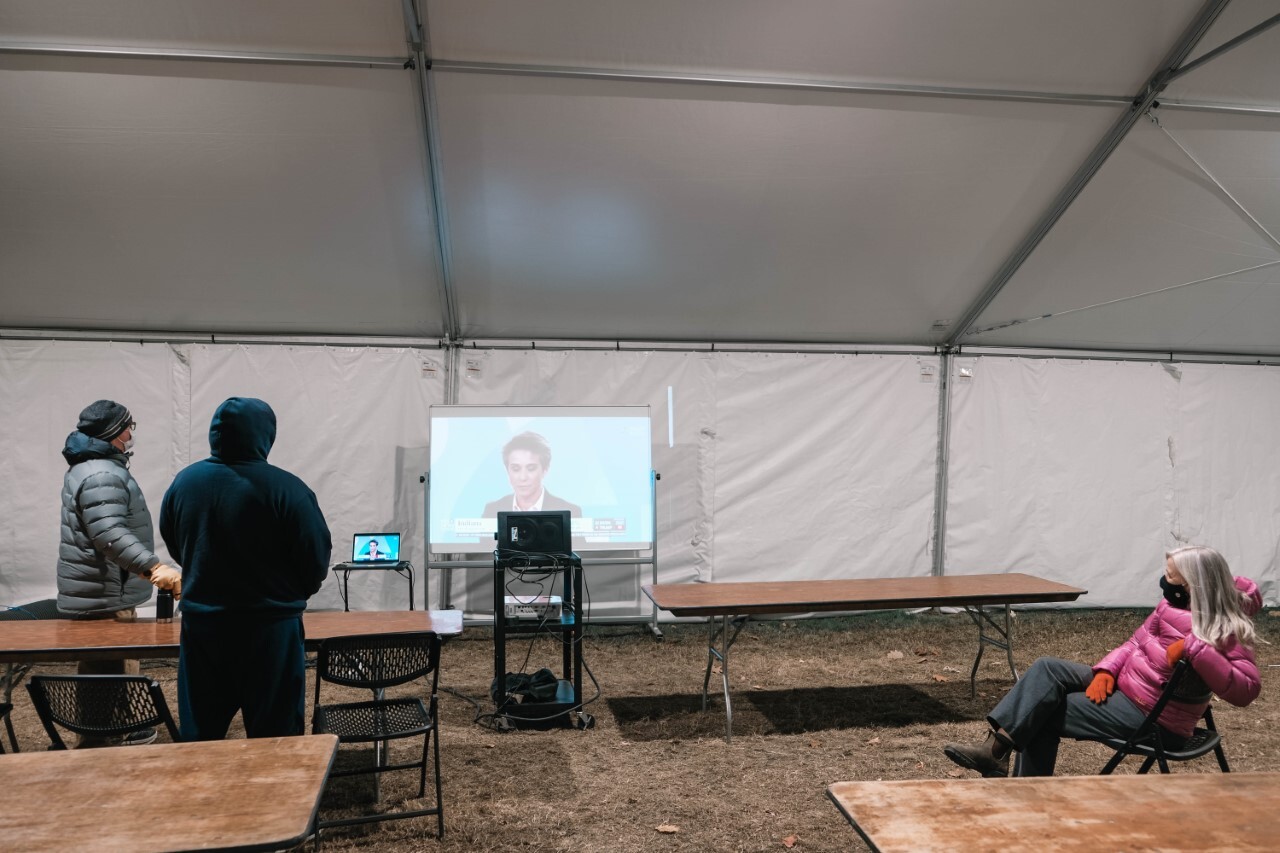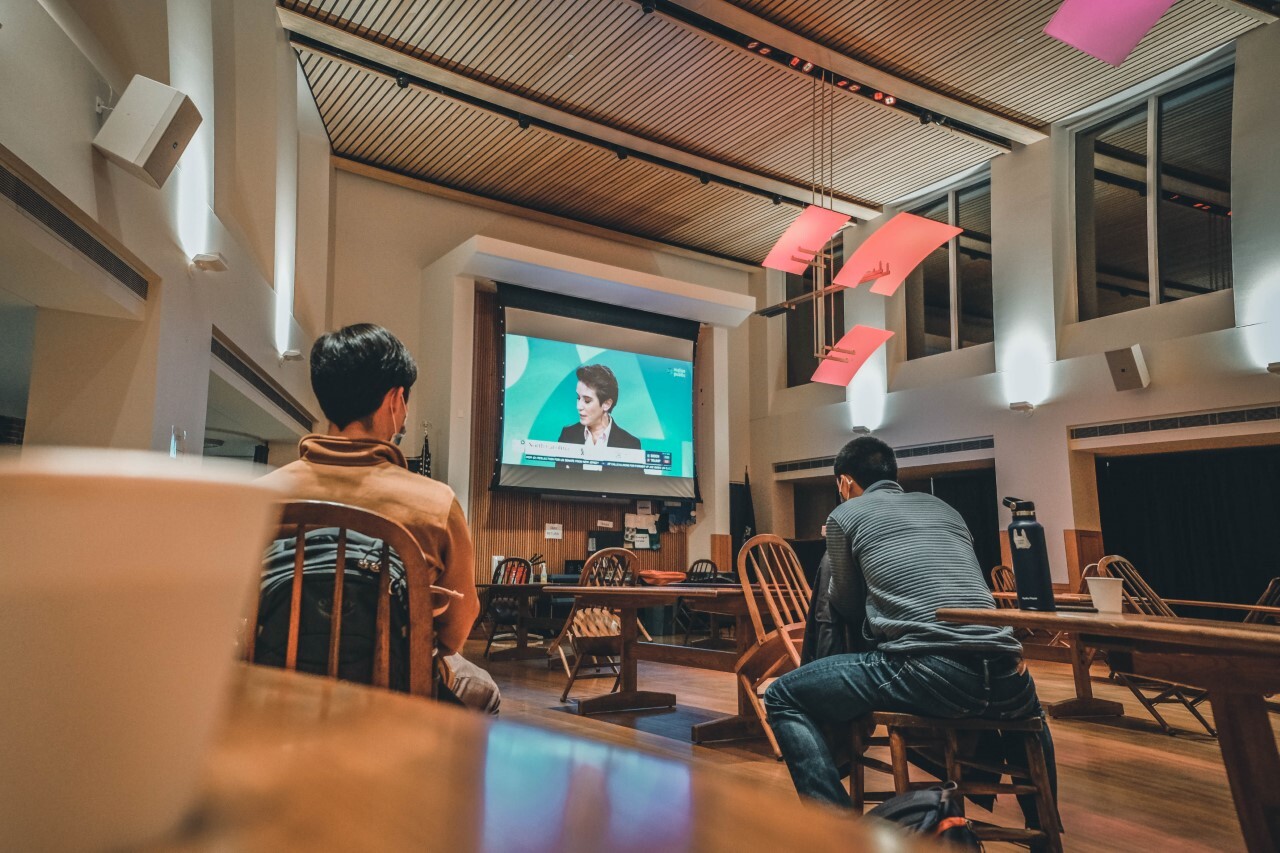Students reflect on uncertain election results
November 6, 2020
 Bryant Ung
Bryant UngWith the results of the presidential election still unclear three days after Election Day, Bowdoin students, along with the rest of the county, are stuck in a state of limbo. Emotions run high, off and on campus.
“I had to sit by and not have a voice in the 2016 election and I was not going to let that happen again,” said Wayne Harding ’21, who voted absentee in New York, in a Zoom interview with the Orient.
Although much was uncertain on Election Night, some students began to have more hope as more votes were tallied throughout the week. Students such as Ryan Kovarovics ’23 were patiently awaiting results from key swing states.
“Let the votes be counted and just encourage everyone to be patient … by the time this is published we probably won’t know the results of the presidential election, and people need to be patient,” said Kovarovics in a Zoom interview with the Orient.
After a more uncertain Tuesday night, some students began to have more hope on Wednesday that Biden would emerge with a clear victory.
“It seemed like there was more hope for people like me who were hoping Biden would win,” said Shea Sewell ’24 in a Zoom interview with the Orient.
Others were surprised at how close the election was.
“It’s ridiculous that it’s this close right now,” said Ahmad Abdulwadood ’24, who is living on campus, in a Zoom interview with the Orient. “I don’t agree with [Biden’s] policies. I think he’s completely messed up. I don’t really like him. And it’s disappointing that I had to vote for him.”
 Bryant Ung
Bryant UngKamryn Speller ’21 was disappointed with the Trump administration but was also unenthusiastic about a potential Biden presidency. Ultimately, Speller chose not to fill in a candidate for President at all.
“I didn’t write in for President. I didn’t think any presidential candidate represented my values or anybody on the presidential ticket represented me,” said Speller in a Zoom interview with the Orient. “It comes down to how these candidates benefit my people, Black people specifically. I didn’t vote for Trump or Biden.”
According to a survey conducted by the Orient, although a majority of eligible Bowdoin students intended to cast a ballot for Biden, 30 percent of them reported that their vote reflected a vote against Trump instead of in support of Biden’s platform. Back before students had a binary choice of candidates, Biden received little support among Bowdoin students in the Democratic primary, as reflected in the Orient’s spring election survey, in which only 15 students indicated that they planned to vote for Biden.
As a first year moving from New York City to Brunswick during the peak of the presidential campaign, Abdulwadood was shocked by the number of Trump signs and campaign materials.
“It’s sort of disheartening the amount of Trump posters you’ll see around, especially the further out you get in Brunswick,” said Abdulwadood.
The 2016 presidential election, and the upheaval of the past four years, led many to mobilize and take political action during this election season.
In the weeks before the election, when she was not in class, Maddie Hikida ’22, the media coordinator for Sunrise Bowdoin and a fellow for Swing Left, was phone or text banking for progressive candidates for six hours a day on average.
“There was no way I was going to give up. I care too much. I much prefer to canvass and knock on doors, but that isn’t a safe option, especially since Maine has such a large vulnerable community,” said Hikida in a Zoom interview with the Orient. “I’m mainly working on vote curing in close states like Georgia to make sure every vote is counted.”
Ballot curing occurs during a grace period when states such as Georgia allow voters to fix issues like rejected signatures on their absentee ballots.
“Some issues are easily fixed, like confirming your signature or sending a photocopy of your drivers’ licenses,” Hikida said. “People usually think it is over after they sent in their absentee or mail ballot, but you have to check to make sure your vote gets counted.”
Although Maine has largely been spared from too-close-to-call races, for many, election results within the states reveal the complexity of Maine politics and allegiances.
Julia Katherine Fiori ’24, who is from Maine and is currently living on campus, said that her roots in the state gave her an intimate understanding of the dynamics of Maine voters. She reported that she wasn’t shocked when Sara Gideon, the current Speaker of the Maine House of Representatives and Democratic candidate for the U.S. Senate, lost her race to Republican incumbent Susan Collins.
“I was hoping Gideon would win but wasn’t shocked when she didn’t pull through. Susan Collins sadly has a really high level of supporters in Maine, especially in areas outside of Portland,” said Fiori in a Zoom interviewwith the Orient. “I think there’s a lot of people who saw that Susan Collins is going to be the senior Senator on the Appropriations Committee, and that equals money for Mainers. So I think there [were] a lot of people who saw that and then were like, ‘Ah, I’m going to vote for her,’ sadly.”
 Bryant Ung
Bryant UngMany Bowdoin students exerted a lot of energy working or volunteering for campaigns and other political causes throughout the summer and into the fall.
K Irving ’21 took this semester off to work on the local issues she finds most pressing. She has spent her time working with asylum seekers in Portland, and for the last two months she has been volunteering to canvass for Sara Gideon.
“Canvassing helps for two reasons. First it helps gage who people are voting for and to convince people to join our side,” said Irving in a Zoom interview with the Orient. “The polls put Gideon in reach and it sadly didn’t plan out. But we’ll try again!”
Samantha Schwimmer ’21, who is one of the leaders of the Reproductive Justice Coalition, worked on training phone bankers in Wisconsin. Having researched likely outcomes based on the order in which states would count different types of ballots, she was was prepared for the map to look redder on election night than it would be later in the week.
“This election was never about saving America. This election was never about restoring the soul of this country. A Trump presidency is terrifying, and it manifests in so many different ways,” said Schwimmer in a Zoom interview with the Orient.
Nina McKay ’21 contributed to this report.

Comments
Before submitting a comment, please review our comment policy. Some key points from the policy: